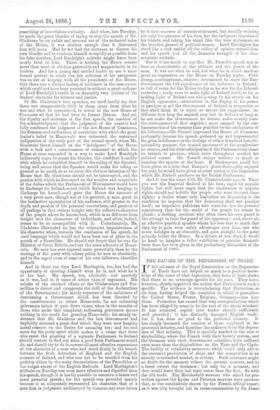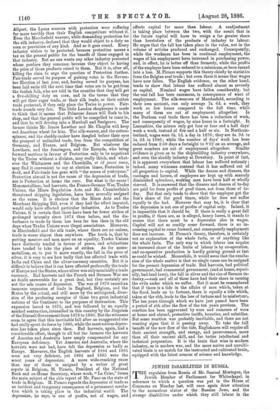THE CAUSES OF THE DEPRESSION OF TRADE.
IF the columns of the Royal Commission on the Depression of Trade have not helped us much to a positive know- ledge of the cause of that depression, they have at least shown that there is no sovereign specific for its cure. They have, however, clearly negatived the notion that Protection is such a specific. The evidence is overwhelming that Protection, so far from having helped the countries in which it prevails— the United States, France. Belgium, Germany—has hurt them. Protection has caused that very over-production which has been alleged by some to be the root of the whole mischief. It has attracted capital into trades already sufficiently well provided ; it has distinctly damaged English trade ; but it has done no good to the protected country. It has simply increased the number of those employed in the protected industry, and therefore the sufferers from the depres- sion of that industry. This is specially marked in the case of shipbuilding, where the French with their bounty system, and the Germans with their Government subsidies, have suffered even more than the shipbuilders on the Tyne and the Clyde. The futility of retaliatory measures, which could only add to the excessive production of ships and the competition in an already overstocked market, is evident. Such measures might no doubt for the moment relieve the present masters, and to a lesser extent the workmen ; but only for a moment, and they would leave their last state worse than the first. So with the silk trade. The Macclesfield weavers who asked for pro- tection against the Lyons and Paterson weavers were unaware that, as was conclusively shown by the French official report, as it was ably brought out in cross-examination by Sir James Allport, the Lyons weavers with protection were suffering far more terribly than their English competitors without it. Even the Macclesfield weavers, while demanding protection for the silk industry, declared that they would object to a duty on corn or provisions of any kind. And so it goes round. Every industry wishes to be protected, because protection means a tax on the general public for the benefit of those engaged in that industry. But no one wants any other industry protected whose produce they consume, because they object to having the price of those products raised to them. But it is, after all, killing the slain to urge the question of Protection further. Fair-trade served its purpose of gaining votes in the Novem- ber Election of last year, and, having served its purpose, has been laid aside till the next time that votes are to be got from the foolish folk, who are told in the counties that they will get a five-shilling duty on corn, and in the towns that they will get their sugar trade, or their silk trade, or their cotton trade protected, if they only place the Tories in power. Fair- trade sounds very fair. The little London shopkeeper is made to think that it means that Primrose dames will flock to his shop, and that the general public will be compelled to come in, and that he will develop into a Marshall and Snelgrove. The farmer thinks Mr. James Lowther and Mr. Chaplin will keep out American wheat for him. The silk-weaver, and the cotton- spinner, and the shoddy-maker have dangled before their eyes the prospect of unlimited trade, free from the competition of Germany, and France, and Belgium. But whatever the Lowthers, and the Jenningees, and the Ecroyds, who bring forward motions in favour of Protection only to be negatived by the Tories without a division, may really think, and what- ever the Whitmores and the Churchills, et Id genus onme, may find it convenient to say at election times, Protection is dead, and Fair-trade has gone with " the snows of yesteryear." Protection abroad is not the cause of the depression of trade, nor is Protection at home the cure. But what is the cause ? Monometallism, bad harvests, the Franco-German War, Trades Unions, the Mines Regulation Acts, and Mr. Chamberlain's threatened shipping legislation, have been severally assigned as the cause. It is obvious that the Mines Acts and the Merchant Shipping Bill, even if they had the effect imputed, would only have affected particular industries. As to Trades Unions, it is certain that there have been far fewer strikes of prolonged intensity since 1874 than before, and the dis- turbance to trade by them has been far less than in the old days when Trades Unions were illegal associations. Moreover, in Macclesfield and the silk trade, where there are no unions, trade is worse almost than anywhere. The truth is, that by putting masters and men more on an equality, Trades Unions have distinctly tended in favour of peace, and arbitrations have tended to take the place of strikes. As for mono- metallism, or, to put it more exactly, the fall in the price of silver, it is easy to see how badly that has affected trade with India and China and the silver-currency countries. But it is difficult to believe that it can have affected profoundly the trade of Europe and the States, where silver was only nominally a trade currency. Bad harvests and the French and German War are no doubt answerable for a great deal, but they certainly are not the sole causes of depression. The war of 1870 caused an immense expansion of trade in England, Belgium, and the States by the actual, and still more by the anticipated, diver- sion of the producing energies of those two great industrial nations of the Continent to the purposes of destruction. This expansion lasted to 1875, and was followed by an equally marked contraction, intensified in this country by the Jingoism of the Disraeli Government from 1878 to 1880. But the witnesses seem to agree that this inevitable fall after an exaggerated rise had really spent its force by 1880, while the most serious depres- sion has taken place since then. Bad harvests, again, had a considerable effect, though to all but the farmers the harvests of America and Australia have amply compensated for any European deficiency. Yet America and Australia, where the harvests were not bad, have felt the depression as badly as Europe. Moreover, the English harvests of 1884 and 1885 were not very deficient, yet 1884 and 1885 were the worst years of depression. A more wide-reaching cause than any of these is assigned by a writer of great repute in Belgium, M. Pirmez, President of the National Bank and ex-Home Secretary, whose work, "La Crise," forms the main subject of the able report of Mr. Fane on the state of trade in Belgium. M. Pirmez regards the depression of trade as an incident and temporary consequence of a permanent revolu- tion which is taking place in the industrial world. The depression, he says, is one of profits, not of wages, and affects capital far more than labour. A readjustment is taking place between the two, with the result that in the future capital will have to resign a far greater share than heretofore of the products of industry to labour. He urges that the fall has taken place in the value, not in the volume of articles produced and exchanged. Consequently, while the workman has been in continual employment, the wages of his employment have increased in purchasing power, and, in effect, he is better off than formerly, while the profits of the employer have been reduced to a minimum,or been turned into a loss. M. Pirmez supports this theory chiefly by statistics from the Belgian coal trade ; but even there it seems that wages have now fallen. The English evidence, on the other hand, tends to show that labour has suffered almost as severely as capital. Nominal wages have fallen considerably, but the real fall has been enormous, in consequence of want of employment. The silk-weavers of Macclesfield, according to their own account, can only average 7s. 6d. a week, they work so few hours compared to the full time, while many of them are out of employment altogether. In the Durham coal trade there has been a reduction of work, and consequently of wages, by nine hours in a fortnight. In Lancashire, the miners only get four or four and a half days' work a week, instead of five and a half or six. In Northum- berland, wages were 6s. id. a day in 1876; they are 4s. 9d. to 5s. 2d. in 1886 ; while the number of days' work has been reduced from 8.58 days a fortnight to 8.12 on an average, and great numbers are out of employment altogether. Similar evidence is given as to the shipbuilding industry everywhere, and even the shoddy industry at Dewsbury. In point of fact, it is apparent everywhere that labour has suffered seriously ; indeed, many witnesses contend that it has suffered out of all proportion to capital. While the dances and dinners, the carriages and horses, of employers are kept up with scarcely diminished splendour, working men have been half or wholly starved. It is answered that the dinners and dances of to-day are paid for from profits of good times, not from those of to- day. But that only tends to show that the employer got the lion's share of the good times, while he does not suffer equally in the bad. However that may be, it is clear that the depression is not one of profits of capital only. Indeed, it is impossible that it should be. If there is really a great fall in profits, if there are, as is alleged, heavy losses, it stands to reason that there must be a depression also in wages. Capital will not so readily come forward, there is no in- creasing capital to come forward, and consequently employment does not increase. M. Pirmez's theory, therefore, is certainly not an explanation of the whole facts, or of anything like the whole facts. The only way in which labour can acquire an increased share of the fruits of labour is by co-operation, and co-operative production is hardly gaining ground so fast as could be wished. Meanwhile, it would seem that the conclu- sion of the whole matter is that no single cause can be assigned for the present depression of trade. Bad harvests, bad political government, bad commercial government, (and at home, especi- ally, bad land laws), the fall in silver and the rise of German in- dustry,—each and all of these have had their share in causing the evils under which we suffer. But it must be remembered that if there is a tide in the affairs of men which, taken at the flood, leads on to fortune, there is equally a tide which, taken at the ebb, leads to the loss of fortune and to misfortune. The ten years through which we have just passed have been a period of ebb after the flow of the ten years previous. The reaction has been aggravated by wars and rumours of wars at home and abroad, protective tariffs, bounties, and subsidies. But some reaction was probably inevitable, and there are not wanting signs that it is passing away. To take the full benefit of the new flow of the tide, Englishmen will require all their ancient strength, and energy, and perseverance, more than all their ancient skill, and far better intellectual and technical preparation. It is the brain that wins in modern industry, as in modern war, and the mere native and unculti- vated brain is no match for the instructed and cultivated brain, equipped with the latest armour of science and knowledge.



































 Previous page
Previous page